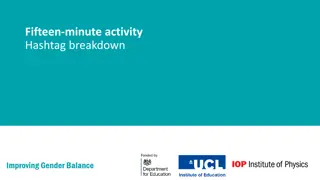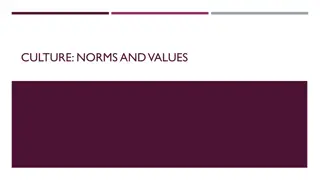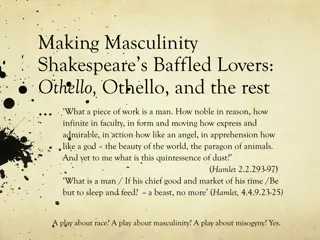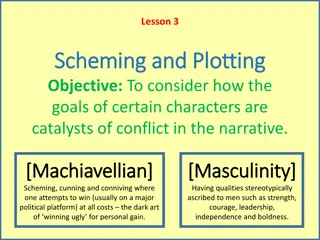Understanding Masculinity Norms in New Zealand
New Zealand faces a challenge with abusive behavior in intimate partner relationships, with one in three women experiencing abuse in their lifetime. This study delves into the impact of masculine norms on men's behaviors and help-seeking tendencies in the context of domestic abuse. Over sixty men participated, sharing candid insights that offer a snapshot of the complexities men face in defining masculinity in New Zealand today.
Download Presentation

Please find below an Image/Link to download the presentation.
The content on the website is provided AS IS for your information and personal use only. It may not be sold, licensed, or shared on other websites without obtaining consent from the author. Download presentation by click this link. If you encounter any issues during the download, it is possible that the publisher has removed the file from their server.
E N D
Presentation Transcript
Scoping the norms of New Zealand masculinity 1 C O L M A R B R U N T O N 2 0 2 0
About this study Summary of key findings Part 1: Part 2: The changing world of men in New Zealand The rules of being a man in New Zealand Part 3: The spectrum of response to these rules Part 4: Part 5: Part 6: Reframing the rules Part 7: The way forward The impact upon help seeking Engagement with help seeking for domestic abuse 2 C O L M A R B R U N T O N 2 0 2 0
New Zealand has a problem with abusive behavior in intimate partner relationships. One in three women are estimated to be exposed to physical or sexual abuse in their lifetime*. *https://nzfvc.org.nz/data- summaries/snapshot **Note on the term domestic abuse . We have used this term to relate to harm between those in intimate partner relationships, including (but not limited to) physical harm, emotional harm and coercive control. We recognise the limitations of this term (and discuss the inadequacy of current language later in this study). Thanks to campaigning efforts in the last decade, New Zealanders are clear that domestic abuse** is not OK. And yet the problem persists. This study is part of a wider understanding of the influences of the gender system on gender norms and expectations within intimate partner relationships. Evidence from overseas*** shows that the presence of unhealthy masculine norms are correlated with factors associated with the practice of violence. *** See the Victorian Government s Framework Foundations 1: A review of the evidence on corelates of violence against women and what works to prevent it. As a nation, we face the uncomfortable truth that abusive behavior in intimate partner relationships is not just in the homes of our perpetrators but in the soil of our masculinity. This study set out to investigate how norms within the gender system impact upon what it means to be a man in New Zealand. The men in our study shared widely held masculine views around the expectations and roles of men. We wanted to understand how those expectations and roles played out for them how they felt, how they behaved and particularly how this impacted on their propensity to seek help in the context of domestic abuse. 3 C O L M A R B R U N T O N 2 0 2 0
Our study engaged over sixty men from all walks of life in New Zealand. Forty of them joined each other in an anonymous online forum, and thirty-six participated in sit down conversations hosted by experienced men s practitioners. Throughout, they did something the normally won t do - they opened up. Not just about their day-to-day lives as men, but about their struggles, their relationships, their dark moments, their hopes and their fears . They did so with perfect candour, and gravity and respect for each other. Men talked, and they also listened. They gave us an up close, intimate and candid snapshot of what it is like to be grappling with being a man in New Zealand today. 4 C O L M A R B R U N T O N 2 0 2 0
PART TWO PART ONE 12 x triad discussions (3 participants per discussion) Qualitative online forum spanning 3 days with 40 people August-October 2020 July 2020 Men from all over New Zealand took part in the Qualitative Online forum. All men who took had attitudes that indicated a strong identification with masculine norms. Some had exposure to violence at some point in the past but they were not recruited for this. These discussions took place in Auckland, Wellington and Gisborne, with a mixture of both face to face and Zoom discussions. They were conducted by Colmar Brunton moderators alongside experienced men s practitioners. 5 5 C O L M A R B R U N T O N 2 0 2 0 C O L M A R B R U N T O N 2 0 2 0
PART TWO PART ONE 12 x triad discussions (3 participants per discussion) Qualitative online forum spanning 3 days with 40 people August-October 2020 July 2020 Re-recruits from the online forum n=15 Not recruited from the online forum n=22 A total of n = 40 18-30 y.o. n=20 31-45 y.o. n=20 Wellington n=10 Auckland n=13 Tauranga = n=3 Gisborne n=8 Christchurch n=3 Maori/Pacifika n=11 Asian decent n=9 Maori / Pasifika n=8 6 6 C O L M A R B R U N T O N 2 0 2 0 C O L M A R B R U N T O N 2 0 2 0
Throughout this Happy wife, happy life Shit my wife just walked in and I got a fright writing this document, names have been changed to protect identities but the words are their own Teo 7 C O L M A R B R U N T O N 2 0 2 0
Maleness has become confusing and very highly charged. Men are often stuck between conflicting messages. and feel like they can t get it right. Even though they may recognise their privilege, they feel that they receive little empathy for their struggles. Women are the key emotional outlet for men. Mates cannot always be relied upon to be a source of support. Today s men are motivated to be better fathers for their sons; this includes greater emotional closeness and better emotional role modelling. The rules required of men in New Zealand are firmly established yet clash with modern ideas of equality and emotional vulnerability. Both men and women reinforce these rules. Shame makes men vulnerable, not just weak, and is a key part of why men may not seek help. Those who are more sensitive to weakness are more likely to be trapped by the rules and more likely to fear shame. 8 C O L M A R B R U N T O N 2 0 2 0
Help seeking is asymmetrical men seem more comfortable with offering help than seeking it. Many men prefer to use a DIY approach to addressing their struggles. This avoids potential exposure and showing vulnerability. A lack of skills to express themselves, poor working knowledge of options and previous poor experiences also keep men from seeking help. Mental health has made some inroads in encouraging men to seek help, but admitting to or even acknowledging family violence is still taboo, even if they may have some degree of private empathy for the man s situation. For communications, any suggestion of shame (even addressing it as a barrier) risks deepening shame. Men prefer and spontaneously suggest a positive, strength based framing around encouraging men to take action for themselves. What men desperately want is to be given a blueprint of how to begin the conversation and some permissibility to do so. 9 C O L M A R B R U N T O N 2 0 2 0
Part 1: 10 C O L M A R B R U N T O N 2 0 2 0
Being a man in today's world feels like a mixture of responsibility, pressure and shame. M a x 11 C O L M A R B R U N T O N 2 0 2 0
A changing world has meant that many men are feeling unsure of what is expected of them. Right from the start of our discussions, it was clear that there is a lot of confusion among many of the men about the socially acceptable way of expressing masculinity. You can t get anything right it seems Everyone says man up , and then also say ew yuck toxic masculinity and rugby is just an outlet for white male rage . It is bloody tough balancing the two issues. Victor Many expressed feeling stuck between conflicting messages: experiencing an ongoing tension between the seemingly contradictory messages of man the hell up and soften the hell up . While some men had been able to formulate a masculine identity that encompasses both, the majority of men in this study expressed an ongoing struggle to navigate the need to be more open and willing to talk with the need to be perceived as strong before others, which we will explore in more detail later. Sometimes it feels like I'm stuck between two worlds of being a macho type kinda man and the new softer, 'more open and in tune with his feelings' man. And anything I do, will get criticized by the other side. Tane The issue for many men is that neither the hard man or the sensitive guy feel wholly authentic. Men in the study articulated feeling stuck because they feel there is pressure to choose and identify as one or the other. 12 C O L M A R B R U N T O N 2 0 2 0
Most men are not nave. They understand and, in many cases, celebrate the changing role of women in our society. They felt that maleness has now become confusing and very highly charged However, there is a vocal cohort of men who have the prevailing feeling that change has happened to them, not with them. While some men have developed strategies to navigate this change, others feel left behind, undervalued and misunderstood. Many of the men we spoke with felt that they are excluded from the conversation. I feel that the role of today's man has become a difficult and confusing one. To be a masculine figure in today's society seems to imply that one is oppressive or toxic. Ryan There is definitely a feminism swing these days and all about women and what they want. I'm all for equality but this is definitely taking away from men and what men should be. Dylan These societal changes, seemingly imposed from outside, have brought more than a tinge of resentment to many of the men in our study. The prevailing feeling among these men is that masculinity is under attack, and uncertainty around how to behave in a way that doesn t appear toxic . I feel that we are enemy number one, the amount of shit going on in the world I honestly feel like I m looked down upon where ever I go. Noah Most men are both aware of the privilege they have as men (and most particularly as white men), and the stresses inherent in living up to and defending notions of masculinity. They may recognize that they are privileged by the system, but they quite often feel individually betrayed by it. 13 C O L M A R B R U N T O N 2 0 2 0
In some cases, this is creating a feeling of double standards Women are as much enforcers of this as men sometimes. There's also a lot of women out there that just want a strong, stereotypical manly man that never shows any vulnerability whatsoever Immanuel Sometimes this creates the impression amongst men that they are being held to account by two different, and conflicting sets of rules. Men still have the same gender expectations. They still lowkey are expected to be the breadwinners if the women can't or doesn't have a good job. They are expected to be strong in the tough times for everyone in the family. They have to keep their woman happy or else she will leave him for another man who can. Jake For example, men are quick to point out the modern requirement to treat women as equals, but also the legacy requirement to be their provider and/or protector. Or how the same behaviour can be celebrated amongst women but deemed disgusting when men do it. It leaves many men with a sense that they can t win . Society in general, and women in particular, are often felt to lend a hand in reinforcing this double standard. Many men talk about experiences of following the new rules but not being rewarded for it. The risk of having sex with any woman is just way too high. If she didn't enjoy the sex or just doesn't like you in the near future all she has to do is contact the police and your entire career and personal life falls apart. Josh 14 C O L M A R B R U N T O N 2 0 2 0
Many men articulated what they perceived as a lack of sympathy for their problems. Many had an abiding feeling that society does not care how men feel. Many men feel that the world is not giving men empathy; and yet they crave it The struggles we heard about in the forum were not insubstantial mental health, relationship issues, porn addiction, loneliness but these same men had the abiding sense that if they speak up about their struggles as men they get shouted down or ridiculed. It feels more and more, that to have an opinion that males don't have everything easy and that we have our own unique set of struggles is somehow devaluing the struggles of minorities or of females. Ryan For some, their current outlet to find the empathy they seek is in chat rooms and other groups of men who agree with them and reinforce their resentments. Echoes of men s rights activists such as MGTOW* were present in our forum. Sometimes can t say what you want to say because it will be perceived as complaining it s hard to say that I need a break or I need a bubble bath. Anonymous group attendee But more hopefully and substantively, the extensive and constructive response that we got to our forum indicates that the vast majority of men are more than willing to talk about issues around masculinity in fact, given the right context, they are craving it. How dare we complain about our struggles as men, when we are at the top of the power hierarchy? Andrew *Men That Go Their Own Way 15 C O L M A R B R U N T O N 2 0 2 0
SOME CHANGE With partners Changing gender norms have impacted three key relationships differently With or as mates Men s LESS CHANGE relationships As SUBSTANTIAL CHANGE fathers 16 C O L M A R B R U N T O N 2 0 2 0
The mates relationship: still mostly centred on distraction and having a good time In spite of efforts to get men to open up to each other, many men still do not have a close emotional relationship with friends to be able to talk with them in times of need. The mate relationship [is] surface level only with guys and conversations centred around movies, games, sports etc without too much depth. Julian Mates are often more about distraction and having a good time. Mates serve as a source of entertainment and physical help talking with mates can actually make some men feel worse because the conversation rarely goes beyond the superficial and can leave men feeling exposed to their mates without having the core issue dealt with. The relationship I have with my best mate is great and I can talk to him about girls and mutual interests and all the other stuff I don't usually talk to my girlfriend about. I can't open up with him like I can my partner but it's still great fun anytime we hang out. Immanuel Amongst younger men we did find a much greater degree of closeness and willingness to support their friends. Not everyone had this, but those that did talked about their relationships with their friends more akin to how those in close relationships talked about their partners. I do not feel as much has changed here, although I would definitely be more open and breach topics with mates now than I would've 10 years ago for example. Dylan 17 C O L M A R B R U N T O N 2 0 2 0
The partner relationship: first port of call and source of comfort in times of need Clearly, our men recognised changes in the practical roles of men and women for example, with more women taking on bread winning and men taking on a greater share of care giving. But the emotional role of women as the safe harbour for men showed that men are still often surprisingly reliant upon their partners as one, if not the only, person they could be their whole self with. Funny I remember drinks with the boys recently, and this topic came up and in drunken confession we all admitted that a kiss on the forehead from our loved one fixes everything and completely disarms us. George Partners (in good relationships) are precious because they are the one place where they can open up. Partners often listen, interrogate and try to understand something that mates often aren t equipped to do. Mothers can also play this role. With your partner, you want to tell her that you're totally equal in the relationship. But you don't want to actually be equal; if you let her take on a full half of the responsibility then she'll leave you because you don't provide for her and what are you worth then? Jake Problems may arise when the person you are having difficulties with in your relationship is the same person you rely upon as your confidante. Many men fear the breakdown of relationships because of losing this connection and their only support person. Furthermore, they fear the risk of the vulnerability they have shown coming back to bite them. 18 C O L M A R B R U N T O N 2 0 2 0
Fathers are the formative influence on shaping most men s idea of what it is to be a man, but most men are acutely aware that their father does not provide all the answers. The father-son relationship: desire to be better men for their sons (and for their sons to be better men) The men in the study who are aware of their father s shortcomings often have sympathy for him (he was a product of his time) but often articulate not wanting to become who he was or replicate his mistakes. We didn't hug our father and the word love was rarely used. This has definitely changed for the better over the years. Miles I know I will never, ever lay a hand on my kids because I know how shitty it is to grow up in that environment and I would sooner die than lay a hand on my partner either. Immanuel For these men, the legacy they have been passed from their fathers about masculinity is often about minimising their feelings and hiding who they are. In the past, kids would always feel that the fathers would be the authority who should be always right and correct. But today s relationship is more like friends. Fathers and sons would prefer to talk more about feelings, and try to understand where they come from . Jack However, there has been a fundamental shift in where men are with their fathers vs where they are with their sons. There is now a general sense that there is more permission to be loving and involved with kids, and the men in the study find this liberating. This is not always easy - how can they pass on something they did not have? Growing up as a pacific islander we never ever spoke of our feelings and that in hindsight is tragic. I know suicide within my community is high and that's because no one these kids love and respect lets them express themselves and ask for help. George Fathers still want (for the most part) for their kids to have masculine traits (respect, backbone, capability) but to this has been added a desire for their kids to be more able to navigate the world with more openness. 19 C O L M A R B R U N T O N 2 0 2 0
I think these rules have been around for ever, and I don t think they will change much. It s just how it is. T e o 21 C O L M A R B R U N T O N 2 0 2 0
Masculinity in New Zealand continues to be rooted in a powerful belief system centred around the expression of strength as the defining characteristic of masculinity It was important to most of the men in the study to feel and present themselves as strong. Although the expression of this characteristic may be changing in recent times, this singular underlying quality of what it means to be a man would no doubt be recognisable to our respondent s fathers and grandfathers. This is a quality that they often also they hope their sons will exhibit. I believe in mental toughness, stoicism and personal responsibility more than anything and I think that's true for most guys. Above all, I am the master of my fate and the captain of my soul. That's probably why I aspire to the ideals embodied by men like David Goggins, Jocko Willink or Marcus Aurelius. I know I still need work and could always do better but strong men like those are what we need more of in our society. Men should be able to be open about their feelings but not in a way that makes them seem weak. You can be real and talk about these things without becoming a blubbering mess. Immanuel So whilst the world that they are operating in has changed substantially, the core of what it means to be a man hasn t changed as much. Most of the man rules (overleaf) that our respondents came up with directly relate to the idea of strength. 22 C O L M A R B R U N T O N 2 0 2 0
A MAN SHOULD Be Be in Be a Be a Be in Be capable control provider protector solidarity uncomplicated of of his emotions for those close for his people with other men to deal with dealing with shit THIS IS STRENGTH AND EQUALS SUCCESS 23 C O L M A R B R U N T O N 2 0 2 0
QUALITY HOW IT PLAYS OUT IN THEIR OWN WORDS Don't ask for help. If you do ask for help, only ask if you really need it. Jake Don't really talk about your issues, until they pop. Murphy Men like to figure things out for themselves, not be told by someone else. Its a pride thing. Irvin You should know your stuff. Jack Don't be a pussy (I.e. take on a challenge or don't give up). Tane Deal with shit from others, from life. Shoulder burdens. Work things out for yourself. Be dependable for those around you. Capability Feelings are for girls - it keeps coming back to this right. Andrew No one wants to see your tears. Vidu Men should be able to be open about their feelings but not in a way that makes them seem weak. You can be real and talk about these things without becoming a blubbering mess. Immanuel Don t lose control of your emotions. Never cry in front of others (except in exceptional circumstances). Never show that you ve been wounded stay tough in the eyes of others Control The rules : How they play out Be a resource for others practical, financial, emotional strength. Be a support - increasingly an emotional provider for kids and close friends. Men need to provide for their families, and failing to do so would make you a failure as a man. Andrew If you let her take on a full half of the responsibility then she'll leave you because you don't provide for her and what are you worth then? Jake Provider Take care of the people in your life you need to be someone they can depend on Be the protector of your partner and female friends. I'm a pretty big guy so if a female friend is walking home I'll go with her to make sure nothing happens to her. Immanuel Protector Stick with your mates. Don t nark. Don t denigrate masculinity. Don t dog the boys (I.e. don't tell your partner or anyone's partner anything that would get the boys into trouble) Tane Solidarity Don't talk about your physical intimacy with others. Tane Don't talk about sensitive topics like addiction, depression and death, things that might make others uncomfortable. Julian If talking to another male, you cannot talk in-depth about your relationship with your partner. Murphy We're expected to handle our own marriage affairs. Teo Do not make others uncomfortable with your problems. Do not burden others. Do not draw attention to yourself unnecessarily. Uncomplicated 24 C O L M A R B R U N T O N 2 0 2 0
If a man is following the rules, he seems to do better in the world. If a man doesn't follow the rules, he seems to suffer some negative consequences. Nobody admits those consequences are because he didn't follow the rules, but for men who are paying attention, it's pretty clear that's what happened. J a k e 25 C O L M A R B R U N T O N 2 0 2 0
The flip side of the strength based man rules is the spectre of weakness and shame. THIS IS STRENGTH AND EQUALS SUCCESS Capable Control Provider Protector Solidarity Uncomplicated Fear Fear Fear Fear Fear Fear Disappointed expectation Exposure Humiliation Failure Exclusion Drama THIS IS WEAKNESS AND EQUALS SHAME 26 C O L M A R B R U N T O N 2 0 2 0
The spectre of weakness is so strong for the men we spoke to in this study because it brings the prospect of shame. Shame is something these men feel when they don t measure up to their own standards or the standards of others it s the feeling that I m not good enough , and that I will be exposed for it. Shame comes in many forms and men avoid it whenever possible All the men in our study connected the man rules with shame, and saw the avoidance of shame as the driving force behind the masculine belief system and behaviours. Even the most confident-seeming men were still somewhat pinned in place by the prospect of shame. I made the mistake of telling the full truth. I admitted that I felt insecure and weak in a certain area. I got emotional. Jake Shame comes in many forms. It isn t merely the threat of public exposure for wrongdoing, but the contravention of the man rules . Being incapable of dealing with difficulties brings shame, because it exposes you as not being capable; losing emotional control brings shame, as it is associated with humiliation; not being able to provide for others disappoints other s expectations of men, and hence brings shame, and so on. I felt a lot of shame and dread when I opened up to my partner for the first time. Tane Shame is something that is feared publicly and felt personally. The worst shame is public shame shame is bad enough in private but unbearable in public. But many men also spoke of an abiding sense of shame for things that they had never revealed to other people. Men directly spoke of hiding feelings and actions that they thought would engender shame. Indirectly, these men often downplayed events that might trigger shame, or sought to justify their actions in order to sidestep the prospect of shame. 27 C O L M A R B R U N T O N 2 0 2 0
Shame is not just a consequence of something, but something with consequences. Shame is a vicious cycle - it makes men feel more vulnerable Looking shame in the eye is very, very challenging concept for the men we spoke to in this study, not least because by admitting to shame you make yourself more vulnerable to other people exploiting your shame, or at the very least, not wanting to be affected by your shame. I think a lot of harmful behaviours by men towards partners are driven by insecurity. From seeing the effects of their harmful behaviours it causes them further negative emotion such as shame, guilt, and embarrassment which makes it even harder for them to seek support. Murphy Shame makes men feel vulnerable, not just weak. It has too high a cost it may come back to bite you: easy for people to take advantage , blow up in your face , the risk of being turned into a (literal) joke. Thus, shame has a double jeopardy the risk of exposure, humiliation, exclusion inherent in the shame itself, and the risk of it being used against you. Some men spoke of a quasi shame hangover where they dreaded the consequences after the event. If I ask for help every time I've got a problem, I am a weak man, and weak men do not do well in the world. Jake Once shame is admitted, there is no going back. It s a risk that many men aren t willing to take, without some iron clad assurances that the gains associated with being vulnerable outweigh the risks of exposure. 28 C O L M A R B R U N T O N 2 0 2 0
Part 3: 29 C O L M A R B R U N T O N 2 0 2 0
Of course, not all men are the same. Not all men respond to the rules in the same way The men that we encountered during the study grappled with the rules and the evolving role of men in a variety of ways. We encountered men who were quite deeply resentful, some who had found an alternative route for themselves, some performers who felt capable to straddle the effects, some who had reformed to better fit their new view of the world, and some who were quite simply a little lost. NB The categorisation of these attitudes, though revealing for the use of analysis, does not assume a value judgement of the attitudes or individuals involved. 30 C O L M A R B R U N T O N 2 0 2 0
Its all bullshit George It s just how it is Teo 31 C O L M A R B R U N T O N 2 0 2 0
Underneath the spectrum of response, sensitivity to weakness seems to be the driving force The spectrum of response allowed for the emergence of five broad archetypes Reformed, Alternative, Performers, Lost and Resentful across our sample. Amongst those Lost or Resentful, traditional masculinity norms were strongly present, broadly accepted and frequently used against them (by other men and women alike). Performers were also invested in these norms but use them more as a template for success. Those who were Alternative are secure enough to disengage from these norms. Only the Reformed see them as something to overcome. Reformed Alterative Performer Lost Resentful Relationship with Overcome Disengaged Invested Buffeted Trapped masculinity norms: Weakness can sometimes be strength Weakness can be acceptable Absence of weakness is a success Weakness is an exploitable vulnerability Sensitivity to fear of weakness Relationship with weakness: The nuances of their perception of weakness were different and seem to drive where men sit on the continuum of adherence to masculinity norms. Those most trapped by masculinity norms had a tendency to see weakness as a vulnerability that would be exploited by others. Sensitivity to weakness 32 C O L M A R B R U N T O N 2 0 2 0
The rules are like a voice that keeps telling you not be weak. The rules are like an overwhelming feeling that constrict your thinking. The rules are like sign that springs up every time you want to seek help but divert you else instead. M a n a i a 33
Those with resentful attitudes appear quite heavily invested into masculine codes and traditional masculine ideals, and hence perceive challenges to these ideas as a challenge to their sense of self. The resentful: I feel that we are enemy number one I feel men are required in today's world just to produce humans. Vidu They tend to see the changing role of women as a zero- sum game, with a corresponding loss to men. It seems that anything you try to do that is considered "male" today is seen as toxic masculinity. Troy There s a sense from these men that men increasingly are outsiders in a world that no longer respects who they are or what they stand for ( I get looked down upon wherever I go ). It's like everyone is trying to second- guess what men do and reprimand them if there's a fault found in the action or the intention. Nickolas The object of their resentment is not particularly the changing role of women, or women themselves, but more what they see as the proscribed activities that have come as a result particularly being able to speak their mind . They are also particularly sensitive to accusations that they are not doing their bit believing that they are making efforts yet but perceive that they are not being acknowledged for doing so. [For his son] Hardworking ,respect everyone and fear no one, don't give up when the going gets tough and when it gets tough dig deep don't let whatever the task is beat you. Noah For their sons, they continue to believe in the value of masculine qualities , particularly giving and receiving respect and hope that society will find a way for them to do this. 34
Those with lost attitudes do not rally against the perceived injustices of an increasingly feminist world, but are clearly and firmly pinned into place by masculine beliefs. They find themselves like a dog with two masters, looking for direction but finding confusing signals. I guess it feels like you can never go about things the right way. Like if you don't like someone s opinion, you're a bigot, if you agree with them you're a sheep. Dave The lost: It s pretty confusing to be a man today They often talk of having sympathy for opposing points of view but have no way of reconciling them. No one likes to be teased etc so I guess its easier for young teenagers etc to just follow the herd rather than be themselves sometimes - I can admit to doing this at times. Sean They seem to be very highly influenced by the judgement and actions of other people. They are keenly aware of the need to fit in, to behave in a certain way and to follow the herd . They crave direction. Their language is littered with references to what is required , what is right , what is pressured . I feel required to stand a certain way or hold my beer a certain way. Ryan The few rules he [my father] did not teach me are taught by social ridicule. If you are doing the wrong thing you'll learn pretty quickly what the right thing to do is. Temuera Many of them spoke of strong (and open) relationships with close friends, but greater hesitation in more general social settings to put themselves out there . They have a deep desire for their sons to be able to reconcile these points of view to be open minded, expressive, their own man, but to do so in a way that would not risk social consequences. I would like my son to be open minded and expressive yet still be able to stick up for himself. I think these are all important aspects but they could conflict with each other. Scott Those with lost attitudes are looking for direction and a way to simplify a confusing landscape. Some are finding it in men s forums. 35
These guys often describe themselves as traditional men and along with that identity, they also strongly subscribe to the old rules . They are much more cognizant of the rules and how to use them to their advantage and as the way to success (or a most certain route to failure if you do not live up to them). They were the smallest group in our sample. It s hard trying to be a traditional male in today's world, ie the strong silent type, involved in sport, the bread winner, the decision maker for the family. Irvin The performers: If you don't fit the mold then you don't get the rewards I learnt to be strong and stoic because my family needed it. I came from a very dysfunctional family that lurched from crisis to crisis, often self inflicted, and they needed someone to show calmness and a rational response. Murphy They will change their behaviour depending on what the situation requires. Of all of the attitudes, this group seems to talk most about masculinity being a performance or a mask you wear This is merely accepted as part of being a man. They are also players in the sense of competing and playing the game of being a man, and abiding by the rules to be successful. Sometimes so much of things are going inside you (like having a bad day in office, financial problems) but you have to show a brave face, act normal as if nothing has happened. Roshin I think we all wear masks, and we wear different masks in different situations. We might bluff and bluster with our mates more so than our wives and definitely more than in front of our children. We are probably more likely to try and be strong in front of our mates than we are in front of our wives. And we probably always try be stoic in front of the kids no matter what is going on. Murphy They are heavily invested in showing strength and confidence, both for their own benefit but also for those around them. They believe that men are attracted to challenge and discipline . They want their kids to be confident, respectful, to value hard work and to be the best that they can be very much qualities that they ascribe to themselves. 36
There were some men in our study that exhibited attitudes which showed a degree of disconnection from masculinity norms. Some of these men are opting out of the game by not buying into many of the gender norms that they see around them. In many cases, they just seem less invested in the old way than other groups. I feel I do have permission to step outside these expectations, however the consequences of doing this may change how others perceive you. Julian The alternatives: I don t buy into these expectations I find the more I step out of these expectations, the more other men see that there is an alternative to the mold. Max Most markedly, these men frequently pinpointed a much broader set of sources for these norms. They had a critical view of cultural influences and could see the impact of them, in an almost philosophical sense. I've met a few straight men that kind of broke the mold in this way and to be honest it'd probably be better for them if they were gay because then you don't really have to adhere to these standards. Immanuel They see the mold for what it is; though instead of breaking it, they decide not to fit into it. Sometimes this seems to be because they are openly gay, which gives them freedom from the restrictive gender norms associated with men. I really find the more honest you are with people the more you get back. Miles There are few hints of traumatic experiences or life challenges in their responses. Instead, they seem to have benefited from strong role models and security that has left them less exposed to the judgement of others. The representation and ideology of characters and figures (movie characters, parents etc) that we have looked up to all our life. It is often that we only see them in their lightest and best moments, being strong and what not. Sean Their hope for their sons is to become their own man , free from the pressures of trying to fit in with what his peers and the media expects of him. They talk about their sons having openness and empathy, though they recognise this is not an easy path. [For son] Having a strong mind to thing for himself and not be swayed by the popular crowd or vote to simply fit in. Julian 37
This group of men all seem to have been on a similar journey, where a moment in life had brought about a reappraisal of their self and how they are affected by the masculine norms around them. Many had come to a place where now they were prepared to call bullshit on some of these norms, because they have lived these, but now have learned another, better way. Their language of rejection is far stronger than other groups. The "rule of being a bloke" in New Zealand are for idiots and those same rules are killing us, wrecking our relationships, our families, losing us jobs and careers and homes. I don't give a fig about them anymore. They've done me no good. Arnold The reformed: What kind of man do you want to be The reformed have learned alternative expressions of masculinity, and they have a language and a discourse that empowers them to talk about it with others. Getting to this place seems to have involved a good degree of hard work and challenge, and often some difficult decisions to leave certain aspects of their previous lives and thinking behind. In many cases, there is a sense they turned themselves into a project . I ended up doing a course that help forced you to let your guard down. The flood gates opened up. I cried almost everyday for a month. It healed me. Dean They have a degree of perspective on what it means to be a man and where these pressures stem from. They stress the idea of thinking for yourself and not simply passing on what others expect. here's a bunch of generic societal expectations of men that force you to abide by them or strive to be like them - which I whole heartedly disagree with. Ilijah It might be easy to think of them as home free , but these men are still mightily aware of the pressures of social norms upon them. They are not free from them, but they are the group that seem to be most open to giving a hand-out to others who they recognise as being in a bad place. They also do not reject masculinity wholeheartedly they continue to see a lot of value in some aspects (protection, respect, strength) but particularly want to drop the emotional stoicism. I'm different when it comes to my boys. I hug and kiss them ALL THE TIME. I've told them that I'll be like this their entire life! Hahaa. Manaia Therefore for their kids, they are looking for them to show kindness, respect, strength for others. Many are consciously role modelling being different father figures to their kids to the type of upbringing they had. 38
What became clear as I got older is that all of these thoughts and ideas that I had about being a man were all passed to me. They were all perceptions that other people had of what it means to be a man! M a n a i a 39
The more we talked about the rules , the more men started to critique them This discussion moved men on from their starting point around the perceived injustices of a more feminine world to seeing the rules that men have always put on themselves as a core contributor to their struggles. Some are only just starting to become aware of this conditioning and to realise the impact of masculinity on men. Once they do realise, it opens the door to more questions, and more conversations. In all likelihood, this was achieved in our forum because it was men leading the conversations with other men, without a sense of defensiveness or judgement. However, the power and persistence of the rules should not be underestimated, as they are deeply connected with the central idea of New Zealand masculinity being an expression of strength and rejection of weakness. 40
Men have learned (or learn very quickly) that when you ask for help, the world looks down on you as a man. J a k e 42
There is among many men the common belief that real men don t rely on others for help Clearly, the association with weakness (and hence shame) is one of the most substantial barriers to men seeking help, and help seeking can be an admission of defeat Despite all the ads saying "it's ok to ask for help" and "it's not ok to hit your wife", men still don't seek help. Makes us look weak is the only explanation I can think of. Arnold Many men feel like they are expected to be capable of shouldering their own burdens as well as those of others. Ergo, seeking help is equivalent to not being capable, so is not done. Men feel an intense amount of shame for asking for help, as the idea of masculinity is based in shouldering burden Reuben Admitting to small things is also hard, because you are supposed to be able to sort them out yourself (with the added danger of being seen as whining ). Therefore in admitting to any problem, it has to be serious by definition. So talking to your mate about how you feel is very hard because again you don t want to come across as soft or weak. Dean This is compounded by the fact that admitting a mistake is shameful in itself, particularly if public (e.g. showing up in bank statements). For most men this is tantamount to an admission of weakness. I don't know if the reasons would even be worthy reasons of why I'm feeling down and also scared of being thought I'm not handling problems well enough. Sean 43
Many men articulate that there are very few people they can be their whole self with. And there is a notable lack of safe spaces to do so. Most turn to their partners (particularly), mothers, mates (occasionally), fathers (rarely) : these people represent a safe place where they can be vulnerable. These are often associated literally and metaphorically with home . Emotional vulnerability is particularly hard I feel society claims that it wants men to open up and express themselves, yet if I encounter challenges in my life I'm supposed to man up . Reality is, no one wants to see your tears. I'm not saying don't cry. I'm saying cry in private. Vidu Some men in the forum spoke of the impacts of breakups. Losing this safe place (person/home) is devastating. It is a threat not merely loss of their outlet and comfort, but brings the threat and shame of vulnerability. Which is why they feel women s reaction to vulnerability can be critical, particularly in the context of abusive behavior in relationships, as it involves the person they might normally emotionally rely on. A woman might want her man to open up about his feelings but then feel dirty and think less of her man for knowing it. Josh Some men see their vulnerability as the reason they have been rejected by women, or pinpoint their vulnerability as the cause of a break-up. This may be perception only, and may require research amongst women to have their perspective on this also. Without a safe place , men s experience can be very isolating, and may be risk factor in itself for mental health, physical health, loneliness and abusive behaviour - all which might be termed diseases of emotional vulnerability . 44
Some men had close friend networks which they trusted enough to ask for help. But many men hesitated to test their relationships, particularly since there is a taboo around talking about relationships in a serious fashion. It seems you can embarrass or harass your mates but you cannot make them feel uncomfortable. I've asked my mates for help, even just to hang out, and they've all scuttled away. Being sad can be contagious and they don't want to be sad. Arnold Some of the men spoke of the abiding hurt caused to them by having their erstwhile mates abandon them at their moment of need, as their relationships or mental health crumbled. Or other times being there for their mates and not having the favour returned. Mates aren t always all that . There is a feeling that divulging problems to mates risks you becoming a burden the implication is that your mate is obligated to do something (rather than just listen). And no one wants to be the guy to kill the mood by getting too heavy when their mates just want to unwind and have a good time. Well obviously we can't just go and ask for help, it'll cost us our mates. Arnold Personally, if I were to keep something to myself it would be to not burden people I care about with my drama. They have their own stuff to worry about, and I'd rather not add to it. Connor Even though many men acknowledged that checking in with each other was now more common (driven by mental health concerns), some individuals spoke not just of hesitation in asking for help, but examples of failure of when they have. They don t necessarily believe that their mates will have any of the answers. Conversely, men who provided help to other men, often found it empowering. Some men, particularly the Reformed , went out of their way to provide it. 45
Not surprisingly given these difficulties around help seeking, the men we spoke to talked of the instinct to fix problems themselves, figure it out, put their head down, work through it (no. 8 wire approach), or to simply ignore it in the hope that it will go away Many men articulate a preference to handle it by themselves in their own way The conversations with men in our study were littered with references to do it yourself . It was of my making in my mind so I had to fix it. Manaia It is ingrained in these men to wait it out until it gets better or much worse, and put duct tape over it for the meantime. It about short term goals surviving through it rather than addressing it. I personally do not want to bother others with my problems. Roshin This approach not only sidesteps the potential social consequences of opening yourself up, but also has the side effect of reinforcing their sense of capability, allowing them to feel more like a man. What I needed was someone to tell me that it was ok that I couldn't handle it on my own. Max The flip side of this is, of course, isolation and the dangers therein. One result of our DIY culture is that many men do not seem to reach out to others, professional or otherwise, until the situation has gone beyond the point of no return and after harm (to self and others) has already occurred. Encouraging men to open up to these issues before crisis point is doubly difficult as talking about trivial problems is seen as showing a lack of capability and causing unnecessary drama, both of which are discouraged by the man rules. 46
However, the DIY analogy for addressing problems only goes so far, as most DIY comes with an instruction manual, a set of tools, skills from experiences and a sense of what the complete outcome should look like. When it comes with dealing with emotive issues, many men have none of these things. Many men are all at sea, trying to find their way through with few tools, skills or support to do it. Added with a hesitation that many often don t know how to address their issues Most of these things or events looking back stemmed from either insecurities and fears that I was harbouring at the time and did not possess the tools for working through them. Immanuel If you yourself can't even understand why you're feeling down and or what it is that you are feeling then it is even harder to try and talk about it. Sean They don t have the language to talk about these issues or a clear picture of what they want to achieve. Many still have uncertainty that the course they are embarking on will have a positive outcome and be worth the risk. Many scenarios in media (TV, movies etc.) show that drinking alcohol, smoking, taking drugs are the alternative ways to get rid of the reality (life problems/issues). There are not much image showing men seek help from professionals. Boys and men may get the idea that seeking help from professionals is uncool. Dave General culture is not a lot of help to men here. Most of the time, men are shown to address their issues in destructive rather than constructive ways through the bottle, through anger, through negative risk taking. John Kirwan and his crusade for men s mental health was seen as a positive antidote to this, but that can only go so far. 47
I think this is mostly because we are just emotionally illiterate. Imagine trying to describe a colour to someone who has never seen it before. You know what it s like but actually putting it into words is more difficult than you d think. Add on top of that the emotional stress from trying to describe it and it becomes almost suffocating. J o s h 48
Opening up to others and seeking help, especially professional help was the last resort for most. When it happens it seems to centre around two tipping points. One is a moment of external crisis like when a partner threatens to leave, a relationship is in the throes of breakdown, or a partner takes kids and leaves. This is when men are left dealing with the overwhelming mental consequences, when being stoic isn t going to cut it and they recognise they need help. Two tipping points: the external crisis and the internal crisis There also seems to be another tipping point which is centred around a moment of internal crisis. This seems to be the threshold at which individuals recognise that they cannot deal with things themselves a moment urgent enough to suspend their reluctance about help seeking. This is precipitated by the realisation that their thinking and behaviour posed harm to themselves or to others. For men that are reflective and self-aware, they can identify changes to their thinking and behaviour and routine that may prompt them to stop and consider their wellbeing. Some men may heed the concerns of those close to them. Men often described both these tipping points as hitting rock bottom . Circumstance forced them to confront their behaviours or attitudes - it became increasingly hard to ignore, rationalise and justify. 49
Building trust is important. Many men talked about using a conversation process that tests the waters, where they would dip their emotional toes in first to determine the level of safety and caution they felt about proceeding. Not admitting things up front maintains an air of confidence and doesn t show weakness. How the other person responded was how they would determine whether they pursued this conversation or end it and possibly look elsewhere (or not). Multiple requests for help can be perceived as a character flaw (by others) and debilitating for self. But if it works, it encourages desire and confidence to keep going. Rule: if you want to talk about your emotions/problems you have to make a joke out of the situation first before discussing it openly. Call it the emotional shoulder price (ESP). The ESP is the price every guy HAS to pay before talking about his personal issues. its usually silently agreed upon that you leave your personal issues at the door before meeting each other. Josh How they open up: testing the waters The things they looked for in the other (supportive) person were whether the other person got them , had a language or was articulate enough to engage in the conversation or provide meaningful support, was caring enough and didn t come across as the labelling or stigmatising type, and was comfortable in listening (rather than jumping to problem solving). However as the person opening up to others you MUST follow up with doing something to address the issue you re talking about otherwise it becomes self defeating and attention seeking. Plausible deniability is one way that males can seek help without damaging their ego and pride as a male. This included the use of jokes and alcohol to defuse and excuse the act of help seeking. 50






















